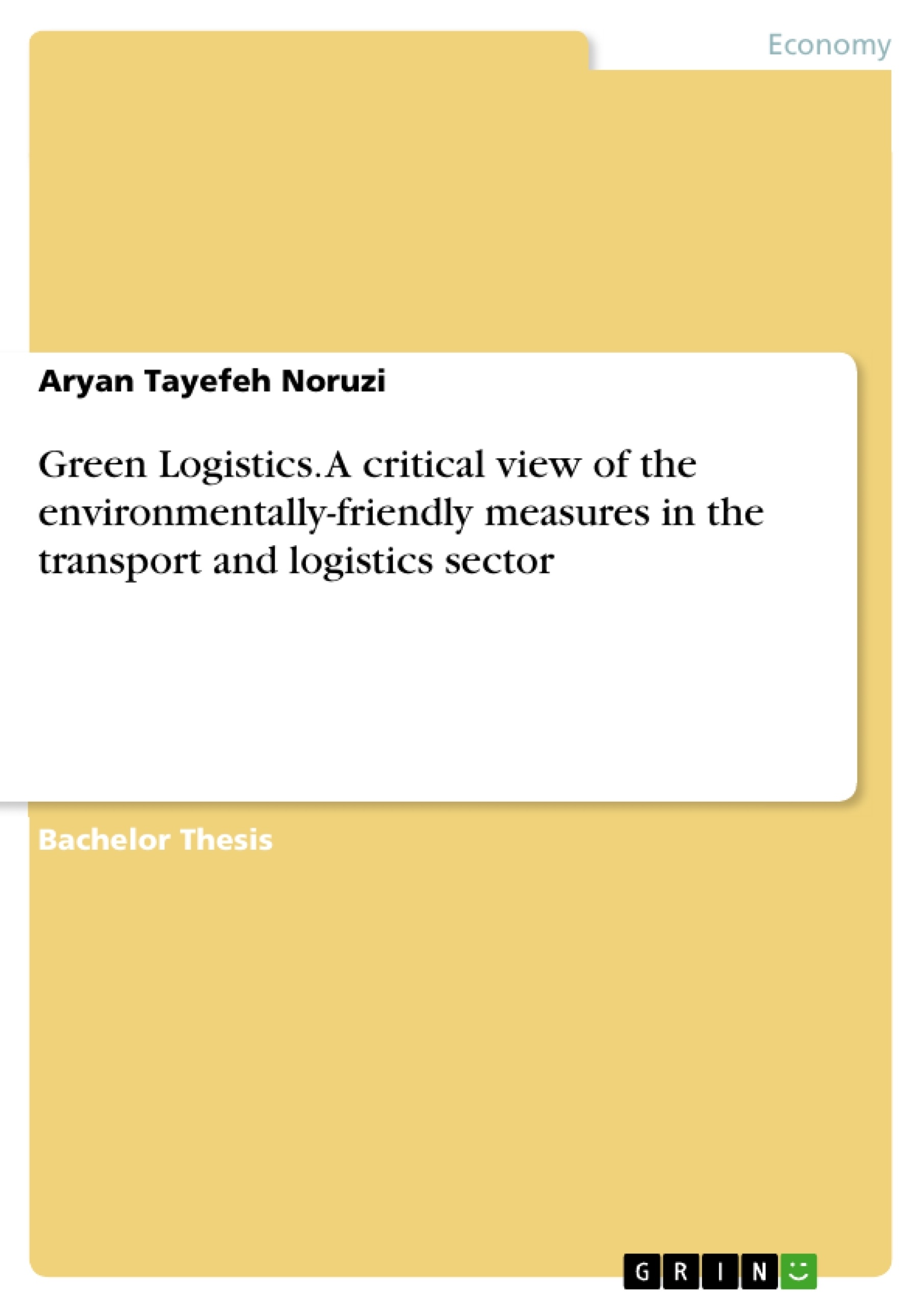What is the main motivation for the implementation of environmentally friendly concepts by logistics companies? Are there really noble goals behind this movement or is it more based on the improvement of their public image?
The goal of this Bachelor thesis is to identify clearly if the measures of the logistics and transport sectors are just to improve their image or if they want to make a significant and real contribution to environmental protection. Furthermore, it will analyse if the implementation of these ecological strategies comes along with economic advantages.
To be able to answer these questions, different exemplary “Green Logistics” concepts will be considered critically with a focus on the implementation of alleged environmentally friendly measures in the transport and logistics sector.
In recent years, climate change and global warming were again and again big topics in politics, the economy and society. International debate about greenhouse gases as well as noise and fine dust pollution attracted considerable attention from the public. According to the report of the Intergovernmental Panel on Climate Change (IPCC), it is becoming obvious that the causes of climate change are the greenhouse gases. This has led to an increased awareness for environmental protection by the general public in relation to the importance for the current and the next generations.
Due to various actions and events, for instance, the nuclear accident in Fukushima and flood disasters in central Europe, the topic of environmental protection has developed as an important element of human action. The essential reason for global warming is the way in which humans live their lives.
In particular, in the western countries the way of life has changed drastically with the introduction of industrialization. Therefore, large quantities of coal, oil and gas are burned resulting in a large amount of carbon dioxide (CO2). That is why the industrialised countries have to carry such a big responsibility when it comes to protecting the environment.
Inhaltsverzeichnis (Table of Contents)
- INTRODUCTION
- PURPOSE OF THE STUDY
- DIFFERENTIATION
- OBJECTIVE
- STRUCTURE
- DEFINITION OF TERMS
- AN INTRODUCTION TO LOGISTICS
- DEFINITION OF SUSTAINABILITY
- DEVELOPMENT AND IMPORTANCE OF THE TRANSPORT AND LOGISTICS SECTOR
- DEVELOPMENT OF SALES
- THE DEVELOPMENT OF E-COMMERCE
- THE DEVELOPMENT OF TRANSPORT OF GOODS...
- THE IMPACT OF LOGISTICS ON THE ENVIRONMENT
- BASIC PRINCIPLES OF GREEN LOGISTICS......
- DEFINITION AND DEMARCATION
- THE DEVELOPMENT AND IMPORTANCE
- GREEN LOGISTICS CONCEPTS - ALL THAT GLITTERS IS NOT GREEN ...............
- STATUS QUO
- BALANCING AND STANDARDS
- ENVIRONMENTAL AND CLIMATE BALANCES
- ARRANGEMENTS FOR A GREENER SUPPLY CHAIN
- ENERGY-EFFICIENT VEHICLE TECHNOLOGY
- CRITICAL VIEW AND INTERPRETATION
- DEUTSCHE POST DHL.......
- CONCLUSION
- SUMMARY AND OUTLOOK ……………………………..
Zielsetzung und Themenschwerpunkte (Objectives and Key Themes)
This Bachelor thesis aims to provide a critical analysis of the environmentally-friendly measures in the transport and logistics sector, specifically focusing on the concept of "Green Logistics." The study delves into the definition, development, and importance of Green Logistics, examining its effectiveness and challenges in achieving sustainability goals.
- Defining and understanding the concept of Green Logistics
- Analyzing the development and significance of Green Logistics in the transport and logistics sector
- Evaluating the effectiveness of Green Logistics initiatives in reducing environmental impact
- Exploring the challenges and limitations of implementing Green Logistics practices
- Assessing the role of key stakeholders in promoting sustainable transport and logistics solutions
Zusammenfassung der Kapitel (Chapter Summaries)
The introductory chapter sets the stage by outlining the purpose, differentiation, objective, and structure of the thesis. Chapter 2 provides a comprehensive definition of key terms, including logistics, sustainability, and the development of the transport and logistics sector. It also explores the impact of logistics on the environment. Chapter 3 dives into the fundamental principles of Green Logistics, defining and explaining its development and importance. Chapter 4 delves into the current state of Green Logistics, examining various concepts, balancing standards, environmental and climate considerations, and arrangements for a greener supply chain. This chapter also critically analyzes the effectiveness of Green Logistics and explores specific case studies, including Deutsche Post DHL.
Schlüsselwörter (Keywords)
This thesis focuses on the concepts of Green Logistics, sustainable development, environmental impact, transport and logistics sector, supply chain management, energy efficiency, and case studies such as Deutsche Post DHL.
Frequently Asked Questions
What is "Green Logistics"?
It refers to the implementation of environmentally friendly concepts and measures in the transport and logistics sector to reduce CO2 emissions and pollution.
Is Green Logistics just a marketing tool for public image?
The thesis critically analyzes whether companies implement these measures for real environmental protection or mainly to improve their "green" public image.
Does Green Logistics provide economic advantages?
The study explores if ecological strategies, such as energy-efficient vehicle technology, also lead to cost savings and better competitiveness.
How does E-commerce impact the environment?
The rapid growth of E-commerce has significantly increased the volume of transport, leading to higher greenhouse gas emissions and noise pollution.
What measures does Deutsche Post DHL take for sustainability?
The thesis uses DHL as a case study to examine concrete arrangements for a greener supply chain and energy-efficient fleet management.
- Quote paper
- Aryan Tayefeh Noruzi (Author), 2016, Green Logistics. A critical view of the environmentally-friendly measures in the transport and logistics sector, Munich, GRIN Verlag, https://www.grin.com/document/343639



